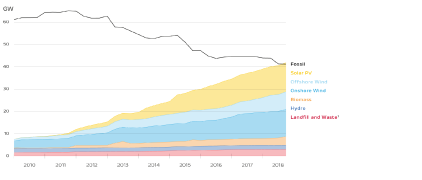
Britain’s total installed capacity of renewable and fossil power stations. Source: Drax – Imperial College London.
The UK’s power sector hit a major milestone in their decarbonisation efforts this year. According to the latest Drax quarterly report, renewable capacity has finally overthrown the generating capacity of fossil fuels, with 41.9 GW of capacity versus 41.2 GW, respectively. That’s a considerable turning point considering fossil fuels had 7 times more generating capacity than renewables in 2010.
Over the last 5 years, over a third of the UK’s fossil fuel capacity, including coal, oil and gas plants, reached the end of their operational lives, according to Dr. Ian Staffel of Imperial College London. This includes a quarter of the regions’ coal plants, which were shut down last year. Because fossil fuel plants are becoming less economical, they are being replaced by renewables whose generating capacity has registered a six-fold growth since 2010.
One of the main reasons for this shift in the energy sector is that the costs of producing renewable energy has steadily declined in the past years. Since 2016, unsubsidized solar power has begun to outperform coal and natural gas in global energy markets. Another factor for this change are the costs of emitting CO2 in Europe, which have increased up to 45% so far this year.
This major green milestone proves that the rising costs of gas and carbon emissions have made a serious impact in the power sector!